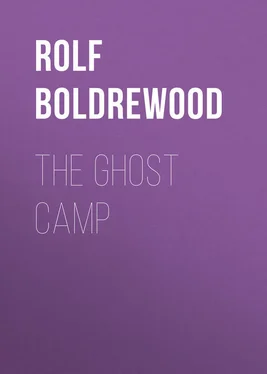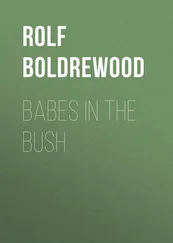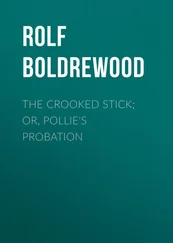Rolf Boldrewood - The Ghost Camp
Здесь есть возможность читать онлайн «Rolf Boldrewood - The Ghost Camp» — ознакомительный отрывок электронной книги совершенно бесплатно, а после прочтения отрывка купить полную версию. В некоторых случаях можно слушать аудио, скачать через торрент в формате fb2 и присутствует краткое содержание. Жанр: foreign_antique, foreign_prose, на английском языке. Описание произведения, (предисловие) а так же отзывы посетителей доступны на портале библиотеки ЛибКат.
- Название:The Ghost Camp
- Автор:
- Жанр:
- Год:неизвестен
- ISBN:нет данных
- Рейтинг книги:3 / 5. Голосов: 1
-
Избранное:Добавить в избранное
- Отзывы:
-
Ваша оценка:
- 60
- 1
- 2
- 3
- 4
- 5
The Ghost Camp: краткое содержание, описание и аннотация
Предлагаем к чтению аннотацию, описание, краткое содержание или предисловие (зависит от того, что написал сам автор книги «The Ghost Camp»). Если вы не нашли необходимую информацию о книге — напишите в комментариях, мы постараемся отыскать её.
The Ghost Camp — читать онлайн ознакомительный отрывок
Ниже представлен текст книги, разбитый по страницам. Система сохранения места последней прочитанной страницы, позволяет с удобством читать онлайн бесплатно книгу «The Ghost Camp», без необходимости каждый раз заново искать на чём Вы остановились. Поставьте закладку, и сможете в любой момент перейти на страницу, на которой закончили чтение.
Интервал:
Закладка:
“Why! how could I lose the way?” he demanded, justly indignant. “Was not the creek a sufficiently safe guide?”
“Oh! it can be done,” answered the girl archly. “There was a gentleman followed the creek the wrong way, and got among the ranges before he found out his mistake; and another one – he was a newspaper editor – thought he’d make a near cut, found himself miles lower down, and didn’t get back before dark. My word! how hungry he was, and cross too!”
“Well, I’m not very hungry or even cross – but I’m going to wash my hands, after which lunch will be ready, I suppose?”
“You’ve just guessed it,” she replied. “You’ll have tea, I suppose?”
“Certainly. Whether Australia was created to develop the tea and sugar industry, or tea to provide a portable and refreshing beverage for the inhabitants to work, and travel, or even fight on, is not finally decided, but they go wondrous well together.”
After an entirely satisfactory lunch, Mr. Blount bethought him of the cob – and knowing, as do all Englishmen, that to do your duty to your neighbour when he is a horse, you must exercise him at least once a day, he sent for George, and requested that he should be brought forth. In a few moments the valuable animal arrived, looking quite spruce and spirited, with coat much smoother and mane tidied; quite like an English covert hack, as Mr. Blount told himself. His legs had filled somewhat, but the groom assured Blount that that was nothing, and would go off.
Taking counsel of the landlord on this occasion, that worthy host said, “Would you like to see an old hand about here that could tell you a few stories about the early days?”
“Like?” answered Mr. Blount with effusion, “nothing better.” It was one of his besetting virtues to know all about the denizens of any place – particularly if partly civilised – wherever he happened to sojourn for a season. It is chiefly a peculiarity of the imaginative-sympathetic nature whereby much knowledge of sorts is acquired – sometimes. But there is a reverse side to the shield.
“George! Ge-or-ge!” shouted the landlord, “catch the old mare and bring her round. Look slippy!”
George fled away like the wind, with a sieve and a bridle in his hand, and going to the corner of a small grass paddock, under false pretences induced an elderly bay mare to come up to him (there being no corn in the sieve), then he basely slipped the reins over her head and led her away captive.
The landlord reappeared with a pair of long-necked spurs buckled on to his heels, and getting swiftly into the saddle, started the old mare off at a shuffling walk. She was a character in her way. Her coat was rough, her tail was long, there was a certain amount of hair on her legs, and yes! she was slightly lame on the near fore-leg. But her eye was bright, her shoulder oblique; and as she reined up at a touch of the rusty snaffle and stuck out her tail, Arab fashion, she began to show class, Mr. Blount thought.
“She’ll be all right, directly,” said the landlord, noticing Mr. Blount’s scrutiny of the leg, “I never know whether it’s rheumatism, or one of her dodges – she’s as sound as a bell after a mile.” To add to her smart appearance, she had no shoes.
They passed quickly through cornfields and meadow lands, rich in pasture, and showing signs of an occasional heavy crop. The agriculture was careless, as is chiefly the case where Nature does so much that man excuses himself for doing little. A cottage on the south side of the road surrounded by a well-cultivated orchard furnished the exception which proves the rule. Mr. Middleton opened the rough but effective gate, with a patent self-closing latch, without dismounting from his mare, who squeezed her shoulder against it, as if she thought she could open it herself. “Steady!” said her owner – “this gate’s not an uphill one – she’ll push up a gate hung to slam down hill as if she knew who made it. She does know a lot of things you wouldn’t expect of her.” Holding the gate open till Mr. Blount and the cob were safely through, he led the way to the cottage, from which issued a tall, upright, elderly man, with a distinctly military bearing.
“This is Mr. Blount, Sergeant,” said the host, “staying at my place for a day or two – just from England, as you see! I told him you knew all about this side, and the people in it – old hands, and new.”
“Ay! the people – the people!” said the old man meditatively. “The land’s a’ richt – fresh and innocent, just as God made it, but the people! the de’il made them on purpose to hide in these mountains and gullies, and show what manner of folk could grow up in a far country, where they were a law unto themselves.”
“There was wild work in those days before you came up, Sergeant, I believe!” asserted the landlord, tentatively.
“Ay! was there,” and the old light began to shine in the trooper’s eyes. “Battle, murder, and sudden death, every kind of villany that the wicked heart of man could plan, or his cruel hand carry out. But you’ll come ben and tak’ a cup of tea? The weather’s gey and cauld the noo.”
Mr. Blount would be only too pleased. So the horses were “hung up” to the neat fence of the garden, and the visitors walked into the spotless, neat parlour.
“Sit ye doon,” said the Sergeant – “Beenie, bring in tea, and some scones.” A fresh-coloured country damsel, who presently appeared bearing a jug of milk and the other requisites, had evidently been within hearing. “My wife and bairns are doon country,” he explained, “or she would have been prood to mak’ you welcome, sir. I’m by ma lane the noo – but she’ll be back next week, thank God; it’s awfu’ lonesome, when she’s awa.”
“You knew Coke, Chamberlain, and Armstrong, all that crowd – didn’t you, Sergeant?” queried the landlord.
“That did I – and they knew me before I’d done with them, murdering dogs that they were! People used to say that I’d never die in my bed. That this one or that had sworn to shoot me – or roast me alive if they could tak’ me. But I never gave them a chance. I was young and strong in those days – as active as a mountain cat in my Hieland home, and could ride for twenty-four hours at a stretch, if I had special wark in hand. Old Donald Bane here could tell fine tales if he could talk” – pointing to a grand-looking old grey, feeding in a patch of lucerne. “The General let me have him when he was cast, that’s ten years syne. We got our pensions then, and we’re just hanging it out thegither.”
“I suppose there are no bad characters in this neighbourhood now, Sergeant?” said Blount. “Everything looks very quiet and peaceful.”
“I wouldna say that,” answered the veteran, cautiously. “There’s many a mile of rough country, between here and the Upper Sturt, and there’s apt to be rough characters to match the country. Cattle are high, too. A dozen head of fat cattle comes to over a hundred pound – that’s easy earned if they’re driven all night, and sold to butchers that have one yard at the back of a range, and another in the stringy-bark township, to take the down off.”
“Yet one wouldn’t think such things could be carried on easily in this part of the country – where there seem to be so many watchful eyes; but I must have a longer ride this lovely morning, so I shall be much obliged if you and our host here will dine with me at seven o’clock, when we can have leisure to talk. You’re all by yourself, Sergeant, you know, so there’s no excuse.”
The Sergeant accepted with pleasure; the host was afraid he would be too busy about the bar at the dinner hour, but would look in afterwards, before the evening was spent. So it was settled, and the recent acquaintances rode away.
Читать дальшеИнтервал:
Закладка:
Похожие книги на «The Ghost Camp»
Представляем Вашему вниманию похожие книги на «The Ghost Camp» списком для выбора. Мы отобрали схожую по названию и смыслу литературу в надежде предоставить читателям больше вариантов отыскать новые, интересные, ещё непрочитанные произведения.
Обсуждение, отзывы о книге «The Ghost Camp» и просто собственные мнения читателей. Оставьте ваши комментарии, напишите, что Вы думаете о произведении, его смысле или главных героях. Укажите что конкретно понравилось, а что нет, и почему Вы так считаете.












